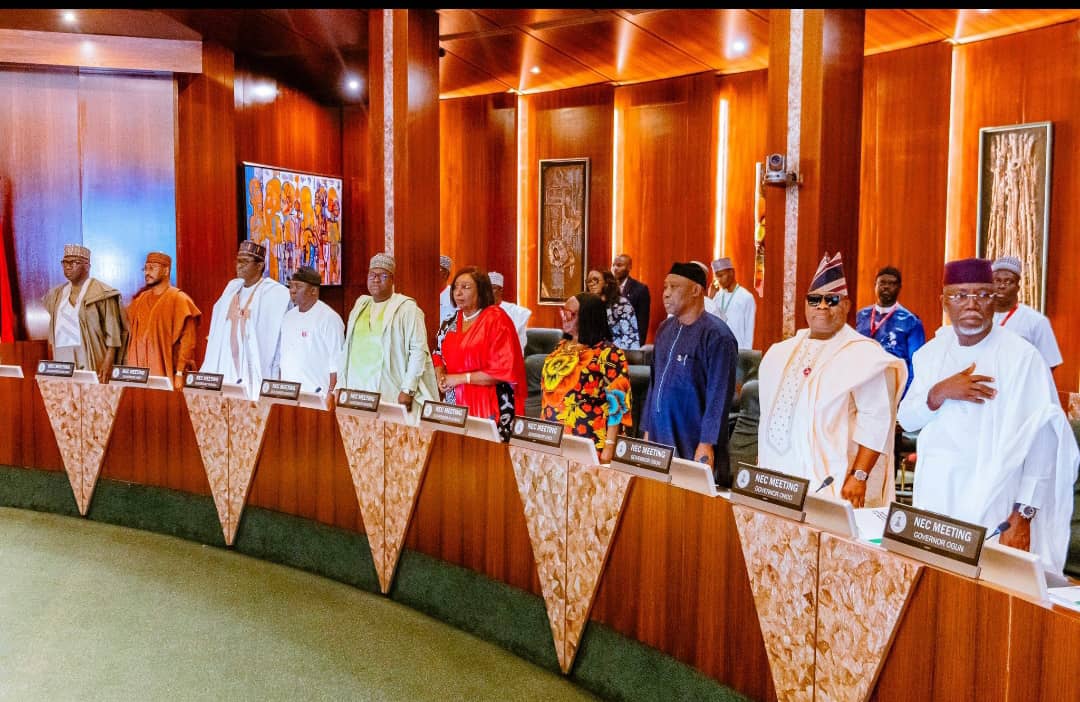Telecom
NEC Calls on States to Embrace NASENI’s Tech Innovations

In a move to fast-track Nigeria’s industrialization, the National Economic Council (NEC), has urged state governments to patronize technological innovations developed by the National Agency for Science and Engineering Infrastructure (NASENI).

The Vice President Kashim Shettima stated this during the 146th NEC meeting which he chaired at the Presidential Villa, Abuja following a presentation by the Executive Vice Chairman of NASENI, Mr. Khalil Suleiman Halilu, which detailed a strategic roadmap by the Agency for Nigeria’s industrialization.
Mr. Halilu in his presentation titled “NASENI Economic Transformation Through Advancement in Technology Transfer and Adaptation”, detailed the Agency’s focus in critical sectors such as Renewable Energy & Sustainability, Health & Biotechnology, Agriculture & Food Manufacturing, Sustainable Transportation & Mobility, Digital Technology, Construction & Smart City, Defense & Aerospace.
The Agency sought NEC support to establish manufacturing industries in states, access local natural raw materials, streamline processes related to land and seaport facilitation, sought guidance or partnerships to tap into public sector market, assistance to set up showrooms for NASENI products and favourable policies to promote NASENI activities.
The EVC/CEO of NASENI highlighted the agency’s innovations in energy security, including electric vehicles, NASENI Solar Home Systems for enhanced rural electrification; Smart devices including laptops and tablets tailored for Nigeria’s market; and Solar irrigation pumps and coal-based fertilizers to improve agricultural productivity.
Halilu reiterated the Agency’s commitment to transforming Nigeria into a global innovation powerhouse through technology transfer, product commercialization, adding that the Agency is working with key partners on NASENI Troment (Vaccine factory), NASENI Portland (CNG Centre), NASENI Devfrontier (Solar light & battery), NASENI Renewable Park and NASENI Family Homes (Sustainable homes).
“Our mission is clear: to make NASENI the ‘go-to’ institution for technology transfer in Nigeria,” he stated, adding that the Agency has attracted $3.23 billion in investments, launched the DELT-Her initiative for female engineers, and how the Agency is championing renewable energy projects.
The Council lauded NASENI’s efforts in driving local manufacturing and industrial development and therefore directed the Agency to scale up the establishment of lithium battery factories in resource-rich regions and repair tractors nationwide under the National Asset Restoration Programme.
The NEC meeting further resolved to harness NASENI’s tailored support for manufacturing and public sector partnerships, ensuring Nigeria benefits from infrastructure, policy frameworks, and market access critical for economic diversification.
NASENI remains committed to working with states and the private sector to unlock Nigeria’s potential for industrial innovation and sustainable development.
Telecom
MTN @ Swish Fusion Summit, Showcases 5G Rollout Strategy

MTN Nigeria Communications Plc has joined other professionals across media, technology, and business gathered in Lagos for the Swish Fusion Tech and Media Summit.

Themed ‘Africa: Big Wins & New Breaks’, the summit drew thousands of attendees and featured more than 40 speakers exploring the intersection of innovation, regulation, and economic growth across the continent.
Among the sessions, MTN Nigeria presented a detailed look at the company’s ongoing 5G deployment efforts and its role in shaping enterprise infrastructure.
Njideka Jack, senior manager for Partnerships in MTN’s Enterprise Business Division, shared details of the investments, reiterating the company’s commitment to delivering high-quality 5G-powered services.
The company’s 5G rollout timeline began in 2022 with license acquisition from the Nigerian Communications Commission. In 2023, MTN moved into pilot testing and infrastructure investment.
By 2024, coverage had expanded to key cities and business hubs.
The company now plans to extend access to more underserved areas throughout 2025 while deepening collaboration with OEMs and regulators.
Beyond the rollout itself, Jack also spoke on the potential of private 5G networks for Nigerian enterprises.
With the ability to offer secure, high-speed, low-latency connectivity, these networks are increasingly being adopted in manufacturing, healthcare, education, and logistics sectors.
The summit’s broader agenda reflected a similar sense of urgency around Africa’s digital future.
Panels and breakout sessions tackled topics ranging from mobile-first product design and regulatory frameworks to the rise of AI in content creation and the realities of funding early-stage tech ventures on the continent.
Speakers from companies like Jumia, Stears and local startups provided perspectives on both the barriers and breakthroughs in building scalable African solutions.
The sessions also sparked conversations about how African businesses are adapting to consumer behaviour shifts and infrastructure limitations.
Telecom
PAT Taps Osi as CEO

Pan African Towers (PAT), a Nigerian infrastructure provider serving 9mobile and Spectranet, has appointed Echezona Osi as chief executive officer.

Echezona Osi
Adefolarin Ogunsanya, company’s, board chairman, explained in a statement that Osi would succeed Oladipo Badru, whose tenure lasted nine months in acting CEO position. Osi has more than 28 years of experience in the telecommunications sector across various regions of Africa.
Prior to his appointment as CEO, he had served as the head of network deployment at Airtel Nigeria, operations director and chief technical information officer at MIC Tanzania, chief technology officer roles at IPT PowerTech Nigeria, Rhino Niger Networks and Biswal Nigeria.
He obtained a degree in electrical/ electronic engineering from the University of Benin and a postgraduate diploma in data science and business analytics from the University of Texas.
Telecom
NCC Introduces N10m Licence Fee for Bulk SMS Service

Companies sending bulk international text messages, also known as Application-to-Person (A2P) messages, will now have apply for a licence that costs N10 million.

This is part of new rules introduced by the Nigerian Communications Commission (NCC) aimed at cleaning up the system, fighting fraud, blocking spam messages and stopping money from leaving the country unchecked.
These A2P messages are the kind customers get from banks, online stores, hospitals and political campaigns, automated texts sent from apps to their phones.
According to the commission, the bulk international text message system has been poorly regulated, allowing misuse and invasion of privacy.
“The International SMS Service Ecosystem in Nigeria has not been fully brought under regulatory control. It has been observed that the excessive use of the Short Message Service has led to fraud, spam and illegal activities,” the NCC said.
The regulator warned that without action, the problem would worsen as more people use mobile phones and digital services.
To solve this, the NCC is creating a central platform, or gateway, through which all international bulk text messages must pass through.
The agency said this would help to monitor messages in real time, ensure proper fees are paid, and make sure the money stays in Nigeria where it can contribute to the economy.
As part of the incoming change, service providers must follow strict rules, including strong data protection, spam filters, and message encryption.
Also, they must also work with local mobile networks and make sure all messages come from a verified sender
The NCC warned that any message without a proper sender ID will be blocked and not delivered to users.
To protect users from unwanted texts, the new rules say companies must get clear permission before sending any promotional content.
The rule also says people must also be able to choose whether they want to receive such messages or not.
Companies are now required to keep records of all messages for at least six months and must clearly state all charges involved.
The NCC said fees for help requests, cancellations, or service info must be transparent and not include hidden charges.
The commission will issue licences to several providers to encourage healthy competition but may limit new licences if needed.
Only companies that show they can stop fraud and safely deliver messages will be allowed to operate. They must also regularly report their message traffic and finances to the NCC.
It warned that any company that breaks the rules risks getting fined, suspended, or having its licence revoked.
Offences like charging illegal tariffs, ignoring security rules, or avoiding taxes will be punished, the NCC said.
The commission added that the new rules follow the Nigerian Data Protection Act 2023 and support the federal government’s goal of strengthening cybersecurity and controlling Nigeria’s digital space.
The framework will also be reviewed from time to time to keep up with new technology and market trends.

 Broadcasting2 days ago
Broadcasting2 days agoNigeria Week Ahead: Inflation, Oil and Naira in focus

 News2 days ago
News2 days agoEFCC: Accusations Against Our Chairman Are Baseless and Misleading

 Telecom1 day ago
Telecom1 day agoMTN Nigeria Targets $1Bn Cloud Market with Largest Modular Data Centre

 Telecom1 day ago
Telecom1 day agoNCC Introduces N10m Licence Fee for Bulk SMS Service

 E-Business1 day ago
E-Business1 day agoFirm Highlights Top Risks of Quantum Computing

 General News1 day ago
General News1 day agoAM Best Reaffirms Stable Outlook for Cyber Insurance Market

 Telecom1 day ago
Telecom1 day agoPAT Taps Osi as CEO

 General News1 day ago
General News1 day agoBurna Boy Distances Himself from Meme Coin, Labels Crypto as Fraud



























